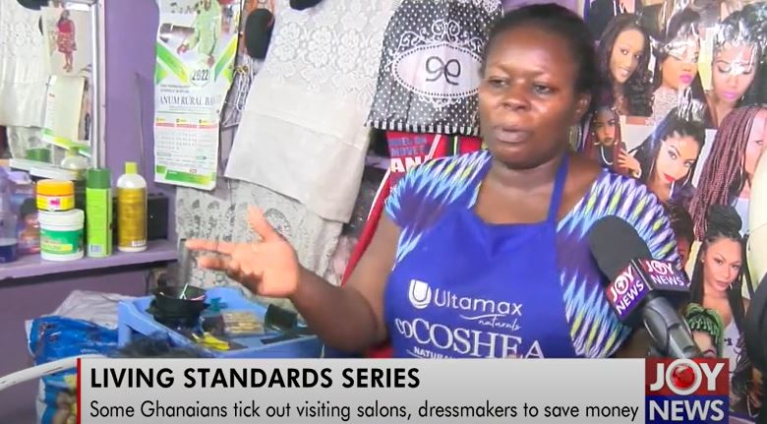Some Ghanaians have begun tightening their budgets to make ends meet due to the incessant increase in the cost of goods and services in the country.
Although the government has not announced an increase in utility tariffs, many suspect the tariffs have been adjusted, a development that is causing people to realign their priorities.
In the current episode of the JoyNews’ Living Standard Series, some residents of Kaneshie, a suburb of Accra, said they have identified a number of items, including visits to the salon and dress makers, which they have removed from their budget.
Shops in the Kaneshie market do not have their own electricity meters; administrators share electricity bills per the number of gadgets in the shop, a situation some traders have complained about.
Jennifer works inside the market as a hair stylist. She targets traders who may be too busy to visit hairdressing salons in their residential communities.
Despite the affordability of her services due to her target market, her customers have not been frequent lately.
The situation is affecting her ability to make her offset her bills, talk less of making profit.
Previously, she had four hair driers and paid over GH¢300 for electricity, but because few customers show up in her shop, paying electricity bills has become a challenge.
To solve the problem of over-billing, she has sent two hair driers home.
For two weeks, not even a single customer visited her shop. Luckily, two customers visited her shop this week. One went to braid and the other to wash her hair.
Her customer, Daavi who had not visited her for weeks, said economic difficulties are to blame. She had to relocate to beat down rent charges.
“This is where I braid my hair but for some time, financial difficulty is making it difficult. Paying of bills in my house always turns into arguments. The bills are high and I would prefer to have my own bill,” she said.
Emmanuella, who is a church administrator, joined the conversation.
She simply cannot explain how her water bills keep rising even though the Public Utilities and Regulatory Commission has not announced an adjustment of tariffs.
“For me, it’s been going high because I usually pay, so I know how much I’ve been paying over the period. Recently, the bill that came was almost GHC130 for water; so, I am wondering why the water is still going high.”
Seamstresses are also reporting low patronage because food prices are high, fuel prices are high and transport fares have equally skyrocketed.
People are left with no option than to kick out many things from their priority lists to survive.
Latest Stories
-
Ghana to implement gradual ban on plastics – Environment Minister
14 minutes -
MoFA declares 2025 closed fishing season, exempts artisanal fishers
15 minutes -
Suspended CJ a victim of her own system – Ansa-Asare claims
21 minutes -
Suspended CJ wrong to seek public sympathy – Inusah Fuseini
25 minutes -
I’m poised to enhance education delivery in my constituency – Gizella Tetteh
47 minutes -
Almost 300 million people worldwide abused substances in 2022 – NACOC
48 minutes -
CSOs must undergo ‘productivity revolution’ to survive new financing landscape – Dr Nii Moi Thompson
50 minutes -
School for Life engages Parliamentary Committee on allocation of resources to rural primary schools
55 minutes -
Parliament champions human rights protection, UPR implementation
56 minutes -
2 CSOs call for withdrawal of PURC’s July tariff adjustment over transparency concerns
57 minutes -
Explainer: Why PURC raised electricity tariffs despite falling indicators
1 hour -
Ghanaians urged to acknowledge God’s goodness through National Day of Prayer
2 hours -
Vice President calls for people-powered financing to redefine Ghana’s development path
2 hours -
Court fines two fish mongers for receiving stolen tilapia
2 hours -
Ho Central MP, Edem Kpotosu advises 2025 BECE Candidates against social vices
2 hours

